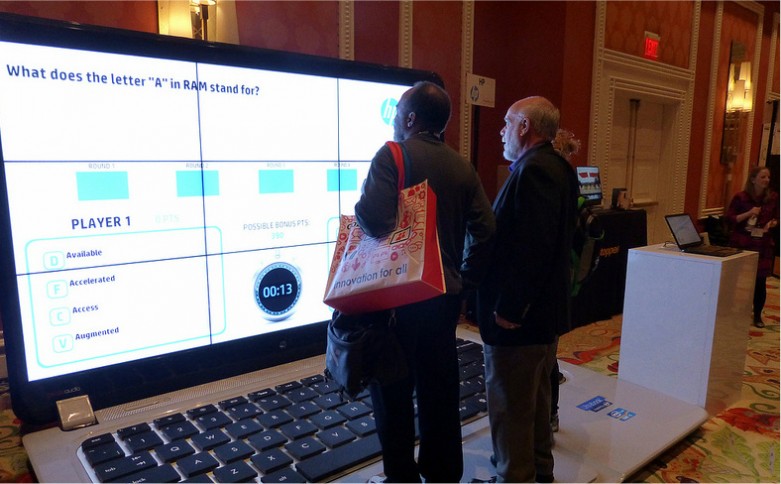
Lifting the Curtain at the Consumer Electronics Show
Last week at Las Vegas’ Consumer Electronics Show — better known as CES — tech engineers, journalists, bloggers and fanboys did their usual thing, i.e., they fixated on new toys and gadgets.
Meanwhile, the men behind the curtain — including the chief executives at AT&T and Verizon — were busy making plans for the future of the Internet.
While attendees obsessed over Samsung's new curved TVs, people like AT&T VP Hank Hultquist were saying things like, “This telephone network we've grown up with is now an obsolete platform, or at least a rapidly obsolescing platform .... It will not be sustainable for the indefinite future.”
Sounds innocuous enough, right? No one could reasonably claim that copper phone lines — what we, in our wireless age, refer to as “landlines” — are the wave of the future. But they’re definitely still of use. AT&T uses them extensively for its broadband service, and some European carriers provide high-speed broadband over them. Is AT&T acting the part of cultural critic or is something else going on?
Something else is going on.
Last year, AT&T announced plans to invest $14 billion to expand its wireless offerings. The supposed goal is to move away from older telephony technology toward a future in which all phone calls are routed through your Internet connection. But AT&T is also trying to boost its profit margin by getting states and federal agencies to remove all regulations that require it to serve the public.
More and more people are using Internet services like Google Voice, Skype and Vonage to make phone calls, so AT&T would like us to believe that it’s simply investing in the inevitable future. With AT&T, however, there’s always something else going on. Those old copper lines reach just about every residence in the country thanks to regulations that require traditional telephone providers to serve everyone who wants phone service.
So if AT&T frees itself from these requirements, thousands of hard-to-reach rural residents might find themselves without phone service. (This explains, in part, why AT&T reached out to the Federal Communications Commission to begin a “dialogue” about how to deal with this shift — in other words, how to deregulate so AT&T isn’t obligated to reach those pesky rural phone subscribers.)
And don’t believe AT&T’s claim that old-fashioned telephone networks are obsolete. Telecom companies rely on these lines to send all kinds of data, and these networks are the backbone for DSL and other data services — including those run by AT&T.
In fact, a network’s physical makeup — whether copper, fiber or cable — is irrelevant; all sorts of technologies can run on all sorts of wires. So to argue that certain connections are obsolete obscures the truth and serves AT&T’s goal of getting the FCC off its back.
Back to CES. At the same time that AT&T was justifying kicking thousands of phone subscribers to the curb, Verizon CEO Lowell McAdam was trumpeting the benefits of a consolidated wireless industry.
“Three to four strong carriers,” McAdam said, “are a lot better for the market than a couple of weak ones that are struggling to stay afloat and do dumb things.” By “dumb things” McAdam means “dumb” behavior — like smaller carriers offering lower-cost service to compete with biggies like AT&T and Verizon.
It wasn’t all doom and gloom in Las Vegas. FCC Chairman Julius Genachowski did make a fairly positive announcement that the agency was freeing a “substantial” amount of wireless spectrum to help with Wi-Fi congestion issues. The spectrum in question is limited — it would boost short-range Wi-Fi networks like those in airports and hotels, as well as the Wi-Fi networks we set up in our homes and offices. But the kind of open spectrum we really need — low-frequency spectrum that travels much farther distances — is, for the moment, still mostly in the hands of our friends at AT&T and Verizon.
On a wholly positive note, Sen. Ron Wyden was also back at CES. Last year, he and Rep. Darrell Issa appeared at the show just days before they helped kill SOPA and PIPA, the twin anti-piracy bills that would have crippled the open Internet.
This year, Sen. Wyden was in Vegas to push an ambitious Internet freedom agenda that includes new antitrust measures that would help protect Net Neutrality, lift restrictions on broadband data caps, reform software patents and increase privacy protections.
Most CES attendees may be unaware of the subtle attacks on broadband competition and the open Internet that took place in Las Vegas. Good for us that Sen. Wyden saw through it all and plans to do something about it.
In the coming weeks and months, AT&T’s and Verizon’s plans to consolidate their power over our Internet connections will become even clearer — as will our plans to fight back.
Original photo by Flickr user David Berkowitz
If you care about preserving our Internet freedom, please consider a donation to the Free Press Action Fund.